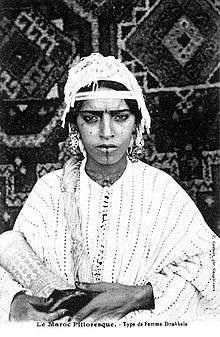Aita (Morocco)
Aita[1] means in Arabic, "call, cry or lament" and is a Bedouin musical style that originates from the countryside of Morocco.
| Aita | |
|---|---|
| Stylistic origins | Arabic music |
| Typical instruments | drums |
| Derivative forms | Bedouin music |
| Regional scenes | |
| Jebala • Khouribga • Chaouia • Abda • Marrakesh | |

Arab woman of Doukkala region
Organisation
It is sung in colloquial Arabic by mixed groups composed of musicians and singers and singers and dancers, these women are called sheikhates.[2] In Morocco, the Aita Festival is organized in Safi.
History
It has been introduced in Morocco by the Bedouin tribes arrived in the Almohad period in the 12th century. Originally from southern Egypt, they migrated westward through regular raids in Algeria and Tunisia.
Ibn Khaldun, a Muslim historian writes:[3]
Similar to an army of locusts, they destroy everything in their path.
gollark: What of it?
gollark: It's 30KB even in a wildly inefficient text format, so with a sensible 2 bit per nucleotide encoding it's 8ish.
gollark: It got sequenced a while ago. The RNA sequence isn't actually very big.
gollark: I copied the SARS-CoV-2 source code into potatOS, actually.
gollark: Oh, are you being quarantined for potatOS?
References
- haita, rita or ghita
- Sheikha in singular feminine
- "François Decret, Les invasions hilaliennes en Ifrîqiya - Clio - Voyage Culturel". www.clio.fr. Retrieved 2015-11-21.
This article is issued from Wikipedia. The text is licensed under Creative Commons - Attribution - Sharealike. Additional terms may apply for the media files.